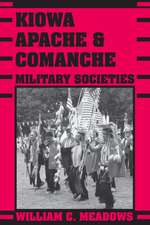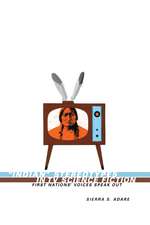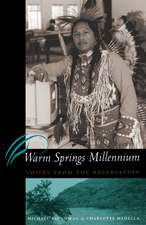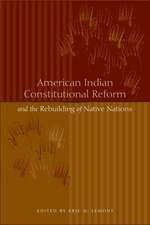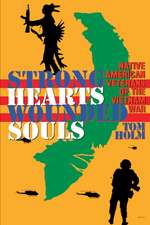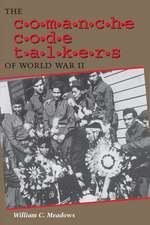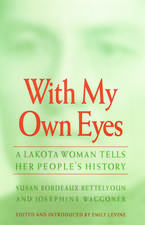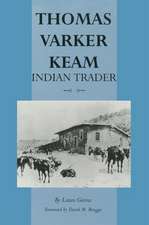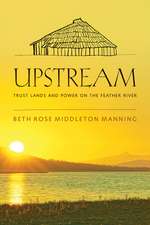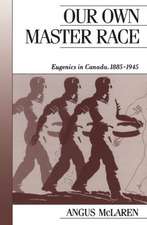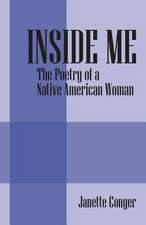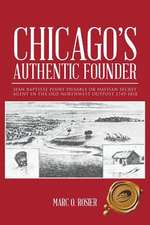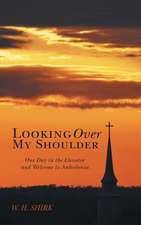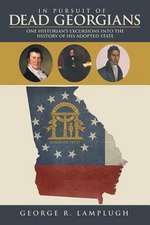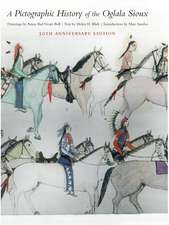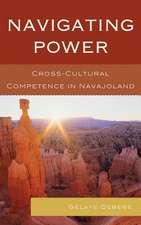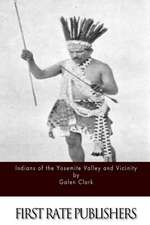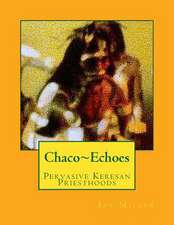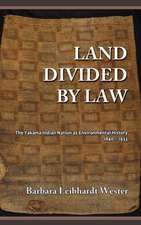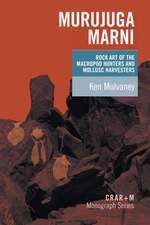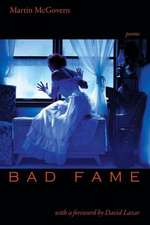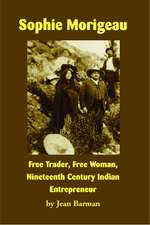Witness: A Hunkpapha Historian's Strong-Heart Song of the Lakotas
Autor Josephine Waggoner Editat de Emily Levine Cuvânt înainte de Lynne Daphne Allenen Limba Engleză Hardback – noi 2013
Published for the first time and augmented by extensive annotations, Witness offers a rare participant’s perspective on nineteenth- and early twentieth-century Lakota and Dakota life. The first of Waggoner’s two manuscripts presented here includes extraordinary firsthand and as-told-to historical stories by tribal members, such as accounts of life in the Powder River camps and at the agencies in the 1870s, the experiences of a mixed-blood Húŋkpapȟa girl at the first off-reservation boarding school, and descriptions of traditional beliefs. The second manuscript consists of Waggoner’s sixty biographies of Lakota and Dakota chiefs and headmen based on eyewitness accounts and interviews with the men themselves. Together these singular manuscripts provide new and extensive information on the history, culture, and experiences of the Lakota and Dakota peoples.
Preț: 617.75 lei
Preț vechi: 726.76 lei
-15% Nou
Puncte Express: 927
Preț estimativ în valută:
118.22€ • 128.37$ • 99.31£
118.22€ • 128.37$ • 99.31£
Carte disponibilă
Livrare economică 02-16 aprilie
Preluare comenzi: 021 569.72.76
Specificații
ISBN-13: 9780803245648
ISBN-10: 0803245645
Pagini: 824
Ilustrații: 26 color illustrations, 115 b&w photographs, 15 b&w illustrations, 1 genealogy, 10 maps, 1 table, 7 appendixes, index
Dimensiuni: 178 x 279 x 67 mm
Greutate: 2.14 kg
Ediția:New.
Editura: Nebraska
Colecția University of Nebraska Press
Locul publicării:United States
ISBN-10: 0803245645
Pagini: 824
Ilustrații: 26 color illustrations, 115 b&w photographs, 15 b&w illustrations, 1 genealogy, 10 maps, 1 table, 7 appendixes, index
Dimensiuni: 178 x 279 x 67 mm
Greutate: 2.14 kg
Ediția:New.
Editura: Nebraska
Colecția University of Nebraska Press
Locul publicării:United States
Notă biografică
Emily Levine is an independent scholar and the editor of With My Own Eyes: A Lakota Woman Tells Her People’s History, by Susan Bordeaux Bettelyoun and Josephine Waggoner, available in a Bison Books edition.
Cuprins
List of Illustrations
Foreword by Lynne Allen
Acknowledgments
Editor's Introduction by Emily Levine
Editorial Policy
Lakota Phonology and Pronunciation
Josephine Waggoner's Family Tree
Ethnography, History, Her Story
Introduction by Josephine Waggoner
Life Sketch
Part 1. Dakota/Lakota Ethnography, Culture, and Society
1. Creation as told by Makhúla
2. The Origin of Fire by Makhúla
3. Makhúla's Dream
4. Sioux Legends and Traditions and Their Origins
5. Ancient Legends of the Sioux
6. The Arrow Makers
7. Dakota and Lakota Oyáte Band Organization
8. Some Cultural Miscellany
9. Language
10. Meaning of Names
11. Some Dakota Geography
12. Buffalo Hunt
13. The White Buffalo
Part 2. Tribal History/Her Life
14. The Cramping Death
15. The Mackinaw (Mackinac) Attack Near Burnt Wood Creek (Cha?gúyapi)
16. The Grattan Massacre
17. Fort Laramie and Horse Creek, 1865
18. The Wagon Box Fight
19. Early Life: Grand River--Apple Creek--Standing Rock, c. 1870-75
20. West to Powder River, 1875
21. Standing Rock, Winter 1875-76
22. T?ahá?ská T?á?ka, John Bruguier
23. Standing Rock and Montana, 1876-78
24. The Surrender
25. Life on the Reservation
26. Hampton Normal and Agricultural Institute, 1881-88
27. Hampton and Back to Standing Rock: Working with Missionaries, 1888-89
28. After Sitting Bull's Death: Wounded Knee, 1890-91
29. Stock Rustling on the Reservation
30. Married Life
Lives of the Chiefs and Other Biographies
Acknowledgments by Josephine Waggoner
Part 1. Isá?yathi, Santee Dakota
1. Támahe, the One-Eyed Sioux
2. Ištá?ba, Sleepy Eye
3. Í?kpadúta, Scarlet Point
4. T?aoyátedúta, Little Crow
5. Thiwak?á?, Holy House
Part 2. Ihá?kt?u?wa?/Ihá?kt?u?wa?na, Yankton/Yanktonai
6. P?alániyap?ápi, Struck by the Ree
7. T?at?á?kap?a, Bull Head Sr.
8. Nasúnat?á?ka, Big Head
9. Mat?ó Gnaškí?ya?, Mad Bear
10. Cha??pílúta, Red Tomahawk
11. T?at?á?kap?a, Lieutenant Henry Bull Head Jr.
Part 3. Thít?u?wa?, Teton Lakota
Section 1. Sihásapa, Blackfeet
12. Wakutemáni, Shoots Walking
13. Mat?ó Wat?ákpe, John Grass
14. Cha?tehi, Goose
15. Cha?té P?éta, Fire Heart
Section 2. Oóhenu?pa, Two Kettle
16. Mat?ó Thuchúhu, Bear Ribs
17. Miwátani Há?ska, Tall Mandan
18. Zi?tkálaki?yá?, Swift Bird
19. Mat?ó Tópa, Four Bear
20. Šú?gleškásápa, Black Spotted Horse
Section 3. Itázipcho, Sans Arc
21. Waánata?, Charger
22. K?a?gí Wíyaka, Crow Feather
23. Héwa?žíca, One Horn
24. Wa?blíglešká, Spotted Eagle
Section 4. Mnik?ówožu, Miniconjou
25. Magáska, White Swan II
26. T?á?cahušté, Lame Deer
27. U?p?ánglešká, Spotted Elk (Big Foot)
28. Cha??á?ake, Hump
29. Magáska, White Swan IV
30. Mat?ó Cík'ala, Little Bear
31. Ki?yá? Hiyáya, Flying By
32. T?ašú?kezi, Yellow Horse
33. Maští?calaglešká, Spotted Rabbit
Section 5. Hú?kpap?a, Hunkpapa
34. T?at?óka Í?ya?ke, Running Antelope
35. Wichá?pi Máza, Iron Star
36. Mat?ó Ité, Bear Face
37. T?at?á?ka Íyotake, Sitting Bull
38. Chetá? Wakí?ya?, Thunder Hawk
39. Phizí, Gall
40. T?at?á?ka Héglešká, Spotted Horn Bull
41. Hohú Cha??pí, Bone Club
42. Mat?ó Ocí?šíca, Cross Bear
43. Itú?kasa? Mat?ó, Weasel Bear
44. Itéomagážu, Rain in the Face
45. Wa?blí?óta, Gray Eagle
46. Heyók?ahmi, Real Buffalo
Section 6. Oglála, Oglala
47. Ma?píyalúta, Red Cloud
48. T?ašú?ke K?okíp?api, They Are Afraid of His Horses
49. T?aópicík'ala, Little Wound
50. Wašícu T?ašú?ke, American Horse II
51. T?ašú?ke Witkó, Crazy Horse
Section 7. Sichá?gu, Brulé
52. Thukímáza, Iron Shell
53. Mat?ó O?'á?k?o, Swift Bear
54. Nú?pa Kap?á, Two Strikes
55. Si?té Glešká, Spotted Tail
56. Šú?ka Bloká, He Dog
57. Mat?ó Kawí?ge, Turning Bear
58. Waglékšu? T?á?ka, Big Turkey
59. Mat?óhé?logeca, Hollow Horn Bear
60. T?ašú?ke Wa?kátuya, High Horse
Afterword: History of the Manuscripts
Appendix 1: The Chiefs Who Fought and Surrendered
Appendix 2: The Keepers of the Peace Pipe Since Brought by the Buffalo Maiden
Appendix 3: Police at Sitting Bull Fight
Appendix 4: Josephine Waggoner's Bibliography
Appendix 5: Winter Counts
Appendix 6: Poems
Appendix 7: Lakota Land Dispossession
Notes
Bibliography
Index
Recenzii
"A book written from a Native person's point of view provides a rare—and therefore much needed—narrative about American society's impact on indigenous peoples."—Edward Valandra, Great Plains Quarterly
"This is an unprecedented addition to the field of Dakota/Lakota scholarship."—Shannon D. Smith, Nebraska History
“Emily Levine has amassed an essential text for all students, professors, scholars, and general readers interested in the history, culture, and traditions of the Oceti Sakowin Oyate, the Seven Council Fires of the Lakota, Dakota, and Nakota Nations.”—Brian J. Twenter, Studies in American Indian Literatures
"This book is a pleasure to open and explore."—Bill Markley, Roundup Magazine
"In this sensitively edited and translated volume, Emily Levine performs a work of recovery mirroring that of Lakota amateur historian Josephine Waggoner (d. 1943) herself: distilling for scholars a disciplined but wide-ranging gathering of historical materials that might otherwise have been forever lost. The list of archives consulted is impressive, and the attention to Lakota expression and Waggoner's intention extremely conscientious. Well illustrated and annotated, it is a major editorial achievement."—American Historical Association
“Josephine Waggoner’s writings offer a unique perspective on the Lakota. Witness will become a widely referenced primary source. Emily Levine has meticulously examined all known collections of Waggoner’s manuscripts, sometimes comparing handwritten drafts with multiple typed copies to preserve information in full. Levine’s extensive notes are well chosen and informative. Witness will interest both specialist and popular audiences.”—Raymond J. DeMallie, Chancellors’ Professor of Anthropology and American Indian Studies at Indiana University

